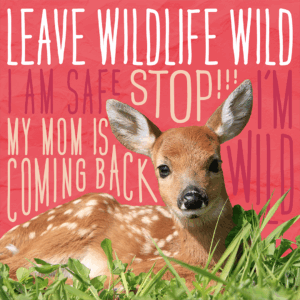
By Lincoln Chronicle
The Oregon Department of Fish & Wildlife has embarked on a campaign this spring to encourage people to leave young wild animals alone and to remind people that most of the time they do not need your help.
The advice you are likely to hear from ODFW if you pick up or encounter wildlife is “put it back.”
“In most cases, the best thing you can do is leave it where you found it,” the agency said in a news release about its campaign. “Kidnapping young wild animals can take away their best chance at survival. The misconception that a young animal found alone has been abandoned or orphaned often leads well-intentioned individuals to intervene, but this can harm the animal and hinder its chances of survival.”
ODFW said it can also lead to a warning or citation from Oregon State Police because removing an animal from the wild is illegal under state wildlife laws.

“Many wildlife species will leave their young while they forage for food,” ODFW said. “When people remove them from the wild, young animals miss the chance to learn where to hide, what to eat and how to escape from predators and other dangers. The time young animals spend with their parents and in their natural environment is crucial for the development of survival skills long term.”
Unfortunately, the agency said, every spring ODFW offices, licensed wildlife rehabilitators, and state police are flooded with calls from people who picked up a deer fawn, elk calf, fledgling bird or other young animal they assumed was orphaned because it was alone.
Even if these animals receive care from a licensed wildlife rehabilitator, successfully returning a young animal to the wild is not always possible, ODFW said. Options for long-term placement in wildlife sanctuaries or zoos are limited, and animals often must be euthanized if they lack the survival skills to be released back into the wild.
Instead, OFW biologists say here’s how to help:
- Keep pets and other domestic animals away from wildlife. Pets will stress wildlife, especially if there are young wildlife or fledgling birds in your yard. Keep dogs on a leash when recreating outside. Keep cats indoors to protect them and native wildlife.
- Give wild animals time, space, and a chance to survive on their own. Wildlife face survival challenges and sometimes need time to recover before moving on.
- If you are certain an animal is orphaned because you saw the parent animal deceased, the animal has not moved on for a day or two, or you see an animal that is injured, call ODFW, a licensed wildlife rehabilitatoror OSP for advice.
- Don’t feed wildlife. All species of wildlife have a specialized diet that coincides with seasonal changes. Access to food provided by people can negatively impact their health, lead to conflict with people and in many cases has fatal consequences. It can also lead to wild animals losing their fear of people and posing a threat to human safety.
Marine mammals
Harbor seal pups are born in late March through April. Females often leave their pups at haul-outs or along sandy beaches while searching for food. Under federal law, it is illegal to harass marine mammals – this includes picking up, moving, or handling a seal pup or any other marine mammal you find at the beach. Beachgoers should stay away from resting seals and sea lions and keep dogs away from these animals as well. Marine mammal strandings should be reported to OSP’s hotline at 1-800-452-7888.
Deer and elk
In Oregon, deer and elk give birth from May through July. It’s natural for mother animals to leave their young alone and hidden for extended periods of time while they go off to feed, so never assume a young animal is orphaned when you see it alone. The mother will return when it’s safe to do so — when people, pets or predators aren’t around. Deer and elk see dogs as a threat to their young.
Birds
Birds nest in the spring and young birds may be found from late February through early summer. Some baby birds, called fledglings, may become separated from their parents as they learn to fly. These are sometimes thought to be abandoned and brought to wildlife rehabilitators. Unless obviously injured, birds should be left where they are or lifted carefully back onto a branch to help them avoid predators like outdoor cats, so they have the best chance at survival.
Ducklings and goslings frequently become separated from their mothers due to disturbance from people or predators. If you spot young waterfowl without a mother, please leave them alone and leave the area so the mother can return.
The agency said there are fewer detections of bird flu in Oregon this year but it is still important to avoid close contact with ducks and geese. It also advised not to feed ducks and geese. Feeding congregates susceptible birds and enables avian flu and other diseases to spread between birds more easily.
Also, Oregon’s wildlife rehabilitators are not currently accepting sick ducks and geese to protect other birds in their care.
“If you care about wildlife, the best thing you can do is observe from a distance, avoid interference, and let wild animals stay wild,” ODFW said.



Comment Policy